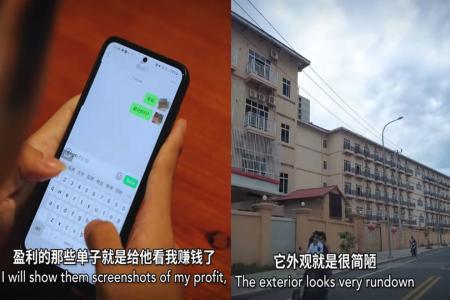Scammed into scamming: Malaysian tricked into working as scammer in Cambodia for 3 months
A 26-year-old Malaysian who accepted a job offer in Cambodia was forced to work as a scammer for a criminal syndicate for three months before he was rescued earlier this year (2022).
His experience was the subject of a video produced by Lianhe Zaobao that offered a glimpse into the syndicates operating out of the Cambodian city of Sihanoukville.
According to the video that was uploaded on June 19, Lee Wei Hong (not his real name) said he received a job offer involving online gambling operations in Sihanoukville from a former colleague.
The offer included, among other things, a monthly salary of US$3,000 (S$4150) to US$4,000, food, lodging and air tickets, as well as commission.
When he arrived at the airport, Lee said his passport was seized by the "company" and that the contract he was shown was "completely different" from what he had been told.
He was then taken to a compound that served as a base for scams operations that targeted Chinese nationals.
The syndicate forced him to work as an online investment scammer, by looking for potential victims on Chinese social media platforms, WeChat and QQ.
Zaobao reported based on Lee's observation that the syndicate had around 120 employees – most of them from mainland China.
Lee gave insight into the scams' various methods, and revealed that at least $410,000 was swindled from around 30 people within three months.
Escape attempt
Lee said he attempted to escape the compound several times but couldn’t because of the compound's isolation and armed security.
Those who were caught trying to escape were beaten and confined, he added.
The compound included various amenities, such as minimarts, living quarters, clinics, restaurants, massage parlours and salons, Lee said.
Lee, however, managed to contact his family and told them about his situation. His family then filed a report with the Malaysian police and embassy, with help from the Global Anti-Scam Organisation (GASO), a non-profit organisation founded by a Singaporean scam victim.
A few days later, the syndicate received a tip-off about the police report regarding Lee.
Lee said his phone was then confiscated, but he managed to avoid a beating by deleting the messages he sent to his family.
He was eventually rescued a week later, under the coordination of GASO.
“Cyber Slavery”
Lee's account is an instance of what Nikkei Asia has called "cyber slavery" in Cambodia, in an article published in September 2021.
Both Zaobao and the Japanese media outlet reported that people tricked into working for such syndicates have been subjected to physical abuse, and even being electrocuted with a taser.
There are people who have allegedly been killed, with their deaths reported as suicides afterwards, according to others who escaped.
While most of the victims tricked into working for such syndicates are from China, many of them are also from South-east Asian countries.
Get The New Paper on your phone with the free TNP app. Download from the Apple App Store or Google Play Store now


